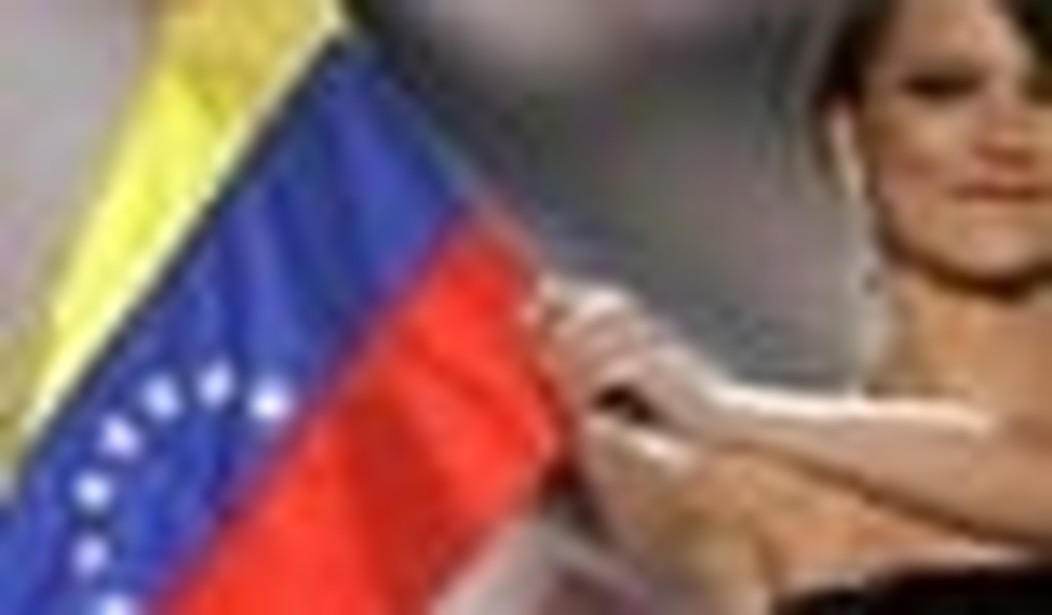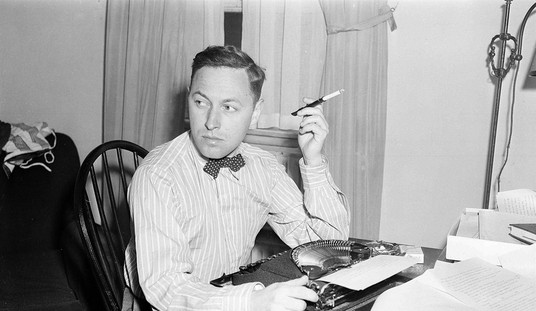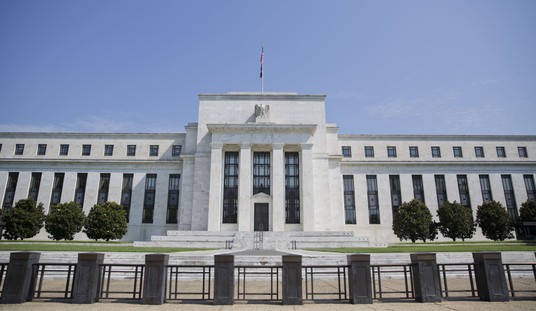The recent loud but silent protest by the very beautiful outgoing Miss Universe, a Venezuelan, has not gone unnoticed in a country where the Miss Venezuela and Miss Universe contests are major distractions from daily woes. Miss Venezuelas have won many Miss Universe competitions, most recently in both 2008 and 2009:
In her last catwalk in Vegas … [the outgoing Miss Universe] decided to unfold a Venezuelan flag, not on protocol. But that was not all, and in Venezuela we noticed that her flag had ONLY 7 stars instead of the official 8 (video here). Sure enough there are already chavistas accusing her of all sorts of conspiracy, and the poor woman might want to think about it before coming back to Caracas. Certain things happen in Vegas that cannot stay in Vegas.
Many Venezuelans view the eight-star flag as representing Chávez rather than Venezuela, and don’t like it even a little bit.
One of the online English language media outlets I go to daily to take the pulse of Venezuela, Vheadline, styles itself as “100% independent of all political factions in Venezuela.” It has however generally been quite supportive of el Presidente Chávez and his merry band. If a recent article there is any guide, the tide may well be turning even among some “elite” Chávez supporters, quite possibly due to the deservedly nasty things being said about Chávez et al domestically and internationally — even by the UN Human Rights Council’s investigator on freedom of expression.
Vheadline had offered some pretty mild criticism in the past, but this article by the editor and publisher, “Alice’s looking glass is surely in need of urgent repair,” should win a Pulitzer prize for unvarnished anger. Published on September 6, it manages to dump a heavy load of fecal matter on the Chávez administration, particularly the (Chavista) United Socialist Party of Venezuela (PSUV) election czar Andres Izarra.
The angry italics and bold face shouting are in the original article:
Wowee! Andres — who used to be a reasonably competent press attache at Venezuela’s embassy in Washington D.C. before he was allowed to let power go to his head as Minister of Communications & Information (Minci) and latterly as president of South America’s CNN-clone TeleSur — gets himself all worked up because … offenders have concentrated on “giving full coverage to NGOs [Non Governmental Organizations], which have allegedly received money from abroad (namely USA/CIA) to engage in a destabilization plan against Venezuela.”
Of course they do … how else is the Venezuelan electorate to get to know about the multitude of things that have gone wrong and continue to go wrong with Chavez’ Revolution. Does Chavez really believe there is any other means by which the Venezuelan public is to get to know about malfeasance in public office, widespread corruption and soaring criminality?
Andres, of course, neglects to mention the hundreds of government-funded local newspapers and radio stations that have proliferated in recent years “to spread the good word” about President Hugo Chavez’ Bolivarian Revolution. …
To crown it all … Andres has just authored a government-funded book called “The Guardians of pornographic journalism” which he admits was dashed off in four days, presumably as a response to opposition newspapers’ “calumny” of publishing a graphic picture from the overflowing Caracas Morgue.
An attack on a close Chávez official is an attack on Chávez personally. Sit, Hugo. Bad dog!
For those who don’t pay much attention to Venezuelan goings-on, there is very little actual opposition media in Venezuela; most have been shut down, nationalized, or otherwise effectively muzzled.
The “pornographic journalism” about which Minister Andres complained so passionately consisted of photos published by el Nacional and then by a few other Venezuelan newspapers attempting to demonstrate solidarity with el Nacional. The photos show large numbers of corpses in the Caracas morgue, because the extraordinarily high murder rate in Caracas leaves few other places to put them out of sight.
The photos were censored by the Venezuelan government:
[El Nacional was] prohibited … from publishing “images, information, and publicity of any type that contains blood, guns, alarming messages or physical aggression images that incorporate warfare content and messages about killings and deaths that could alter the well being of children and adolescents.”
Doubtless coincidentally, the prohibition is for the four weeks leading up to the September 26 general election.
The photos involved only one morgue in Caracas. According to el Universal, another Venezuelan newspaper:
Caracas has now the world’s highest murder rate. According to official figures reported by a survey on victimization carried out by the National Statistics Institute (INE), the Venezuelan capital has become the deadliest city in the world. A total of 7,676 people were killed in the Metropolitan Area of Caracas in 2009, that is, about one murder every hour and a half.
The murder rate in Venezuela as a whole is also rather high. According to the Venezuelan government figures, there were 13,975 murders there in 2009, compared with 5,968 in 1999. That’s 38.29 per day, or 1.6 per hour:
The UN’s latest figures show that the murder rate in Venezuela is 52 per 100,000. That compares with 11.6 in Mexico, where a gruesome drug war is playing out, and 38.8 in Colombia, whose government has been at war with insurgents for decades.
While none of these statistics may be highly accurate, particularly those from government sources which usually are not, Venezuela may not be a relaxing place for a vacation or, for that matter, in which to live or die. Iraq, with only 4,644 murders in 2009 in a population slightly greater than that of Venezuela, seems relatively more tranquil.
It is highly likely that even with rampant censorship, the people of Venezuela have a good idea of the level of criminal violence there; they can’t avoid it because they live and die there. It also seems likely that they understand Chávez’ Bolivarian Socialism is among the major causes. The anti-Chávez gesture by the outgoing Miss Universe was as symbolic as it was brave:
Fernandez waved her flag for the same reason Americans waved theirs after 9/11 — to convey resolution amid distress. Her flag had seven stars, significant because Chavez had arbitrarily added an eighth, making any use of a difficult-to-find seven-star banner an act of defiance.
Fernandez’s countrymen went wild with joy on bulletin boards and Facebook, showing just how worried they are about their country. Their greatest fear is violent crime.
Crime is a big issue, and should be a major factor in the elections scheduled for September 26, despite Chávez’ claims that the murder rate is no worse now than eleven years ago; it is. Gross incompetence, corruption, inflation, scarcities of basic food, and the shortage of hard currency needed to import food as well as other necessities — due to decreased oil revenues — haven’t helped either. Of course, nothing is Chávez’ fault, and he is said to have created three and one half million jobs. Nearly all are presumably in the public sector. Still, his popularity even among the poor, of whom there are very many in Venezuela and who have traditionally been his electoral base, has declined remarkably, and hit a seven-year low of 36 percent in July.
Unfortunately, facts and popular discontent are not likely to have much effect on whether Chavista candidates win sufficient seats to continue to control the national assembly. As noted in the Buenos Aires Herald:
Analysts expect his ruling socialist party to retain control at this month’s polls, but say the opposition is forecast to win at least one-third of the seats in parliament.
With PSUV election czar Andres Izarra calling lots of the shots, rampant gerrymandering, many opposition candidates in jail either on trumped-up charges or none at all, and likely fraud, there is little hope for a peaceful transition of power. It may be that the only “hope” for salutary change will involve a violent post-election revolution, which if it comes, will be very bloody.
Might that be a principal reason why Chávez is buying lots of armaments from China and Russia? I don’t know, but it could provide for some rather interesting speculation later this month.









Join the conversation as a VIP Member